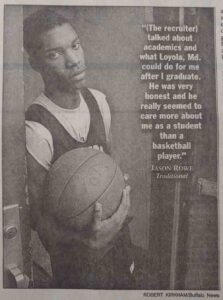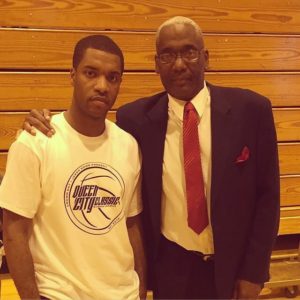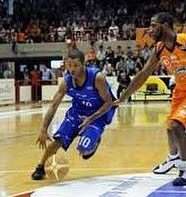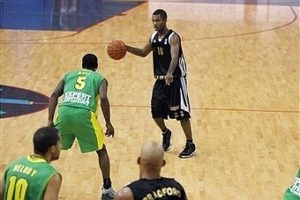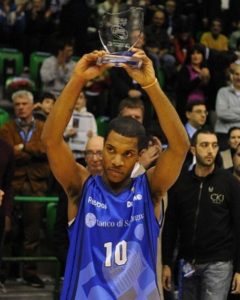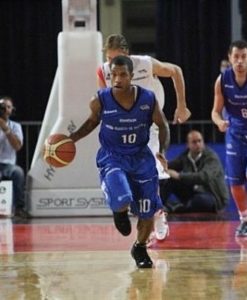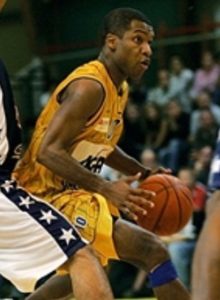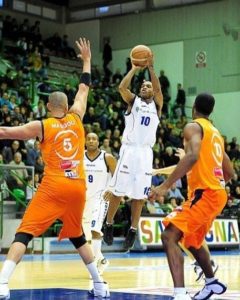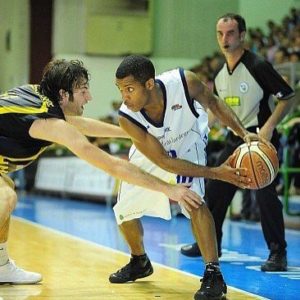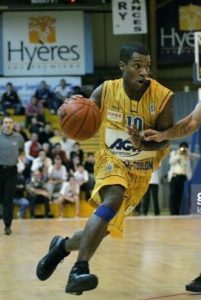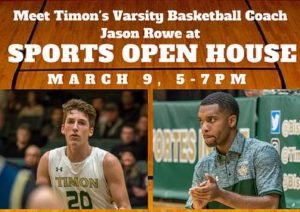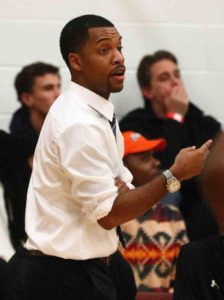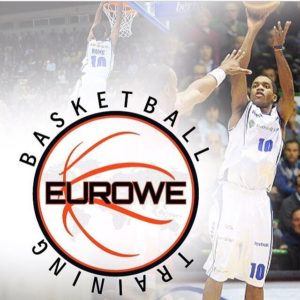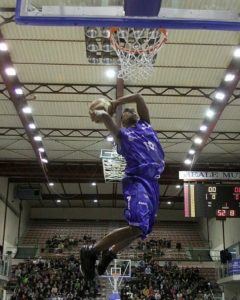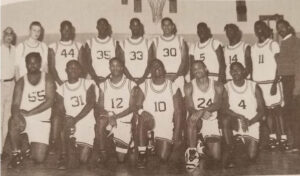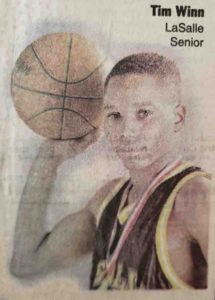 The first principle of my blog is Creating Ecosystems of Success. A key aspect of creating them is hearing the stories and experiences of those who have made it to where we want to be. Like many kids, an early dream of mine was to play basketball. That dream didn’t reach fruition, but the lessons I learned playing in Section VI, the New York State Public High School Athletic Association’s western-most section, laid the groundwork for me to go on to further my education and start my science career.
The first principle of my blog is Creating Ecosystems of Success. A key aspect of creating them is hearing the stories and experiences of those who have made it to where we want to be. Like many kids, an early dream of mine was to play basketball. That dream didn’t reach fruition, but the lessons I learned playing in Section VI, the New York State Public High School Athletic Association’s western-most section, laid the groundwork for me to go on to further my education and start my science career.
I’m working on a book project chronicling my early journey entitled, The Engineers: A Western New York Basketball Story. As a part of the research for that project, I’ve interviewed numerous Section VI basketball players and coaches from my era. On June 4, 2018, I had the honor of interviewing Tim Winn – a Western New York basketball legend and one of the last in a long line of great point guards in the LaSalle basketball dynasty – arguably the most dominant high school basketball program ever in Section VI and the Western New York region. In the early- mid-1990s, Tim Winn was Western New York’s other top point guard alongside Buffalo Traditional’s Jason Rowe, and has the distinction of making the State Tournament in Glens Falls each of his four years in high school.
In part one of this two-part interview, Tim discusses his background, how he started playing basketball, and how he became one of the legendary point guards in the LaSalle basketball dynasty. The pictures in this interview come from an archive of Section VI basketball assembled over the years from issues of the Buffalo News, the Rochester Democrat & Chronicle, and Sections V and VI playoff programs by my first Coach at Hutch-Tech High School, Dr. Ken Jones. Other pictures were generously shared by Tim himself, and his Head Coach at LaSalle Senior High School, Pat Monti. Click on any of the images to enlarge them. Links follow up video interviews with Tim, Modie Cox and other LaSalle coaches and players are at the end of this interview.
Anwar Dunbar: First Tim, I want to say that I really appreciate your willingness to talk about your playing days and LaSalle basketball. This really, really means a lot.
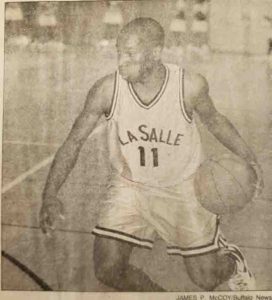 Tim Winn: No problem. The older you get, the only thing you’ve got left are your stories.
Tim Winn: No problem. The older you get, the only thing you’ve got left are your stories.
AD: I’ll tell you a little bit about me and then we’ll jump in. I’m a blogger/writer and a native Western New Yorker just like yourself. One of the things I write about on my blog is success and failure, and my first major success and failure lesson in life was my high school basketball experience at Hutch-Tech in Buffalo. I didn’t go on and do anything as spectacular as you and Jason (Rowe) did, but that was my first time dreaming about doing something, and then feeling some disappointment. That served as a template for the rest of my life also. It’s a story I always wanted to tell, and that’s what I’m doing now.
The way that I wrote this up, it’s about my journey, but it also ends up being about Section VI as well, and you can’t tell that story without discussing the power programs – LaSalle, Buffalo Traditional and all of the teams that made their championship runs in that era. Traditional made deep runs in postseason play most years, but your teams at LaSalle were there at the end pretty much every year – for 10 straight years according to what Coach Monti said. Everyone was gunning for you guys so again, it means a lot to be able to talk about the brown and gold.
I’m going to start at the very beginning. While I knew about some of the ballplayers from Niagara Falls in the 1990s, I didn’t know any of you guys personally. Where is your family from?
TW: My grandfather is from Alabama and my grandmother is from Columbia, SC. They migrated up north way back in the day. I grew up on the east side of Niagara Falls.
AD: They came for the industry jobs?
TW: Yes, exactly.
AD: When did you start playing basketball?
TW: I was about five years old. There was a “Biddy Basketball” league in Niagara Falls. They had two age groups – 12 and under and then 12-14 years old. At five years old you were old enough to play.
AD: You know, the first time I heard of the Biddy leagues was in ESPN’s 30 for 30 documentary on Benji Wilson. When Common mentioned it, I had no idea what he was referring to. Were those held at playgrounds or at community centers?
TW: I played for a team called the “Thirteenth Street Center”, but all of the games were held at the Boys and Girls Club in Niagara Falls on Saturday mornings.
AD: Your Dad, uncles, or any older brothers – were they basketball players too?
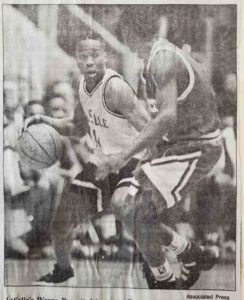 TW: My Dad was a great athlete. Rumor has it that he could’ve gone pro in football, baseball, or basketball, but he chose the street life – a typical story where we’re from, you know? It ate him up and it never panned out.
TW: My Dad was a great athlete. Rumor has it that he could’ve gone pro in football, baseball, or basketball, but he chose the street life – a typical story where we’re from, you know? It ate him up and it never panned out.
AD: So you must have played for your middle school team?
TW: We didn’t do that in Niagara Falls. We played in the Biddy leagues and that was pretty much it. You played for your neighborhood club – the Boys and Girls Club – I played at the Thirteenth Street Center.
There were different community centers throughout Niagara Falls, and you played for the community center within your neighborhood. There are eight or nine different community centers in Niagara Falls that are spread out in the different neighborhoods. The kids migrated to each center, joined the basketball team. There were also games at the Boys and Girls Club.
AD: That’s very different than what we had in Buffalo. Does that mean your middle schools didn’t have teams at all?
TW: Elementary school? No. You either still played in the Biddy leagues or you tried out for one of the Junior Varsity (JV) teams in the sixth or seventh grades.
AD: Okay, I’m just trying to put everything together because your Coach at LaSalle, Pat Monti, shared with me that the LaSalle players were exposed to the program prior to the ninth grade.
TW: I played JV in the seventh grade. When you have a historic program like LaSalle’s with such a rich tradition, the conversation is always amongst you and your peers. How long are you going to play in the Biddy league? When are you going to try out for the JV? It was really common for guys in the seventh grade to go try out for the JV teams. Obviously, everyone wasn’t going to have success, but it was common. The best players in the Biddy league were presented with the opportunity to try out. Coach Monti’s program had been around for a million years for those of us who lived there.
AD: Did you guys have the option of going to LaSalle or Niagara Falls Senior High Schools? How did that work?
TW: It was all based on your address. I lived right next door to someone who went to Niagara Falls High School. The city broke it down in a weird way where it was strictly addressed-based. For me it was the ‘luck of the draw’. If I lived one more house over, it would have been Niagara Falls High School instead of LaSalle.
AD: Which college and professional players did you look up to? Was it Michael Jordan? Was it someone else?
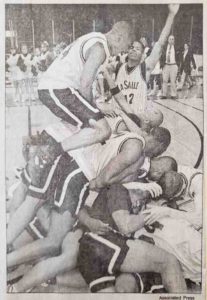 TW: It was Isiah Thomas all day long.
TW: It was Isiah Thomas all day long.
AD: Was it because of his ‘handle’? Was it because he could shoot it as well?
TW: All of it. It was his handle, his competitive nature – just that fight. Where I’m from, if you didn’t’ have that fight in you, you couldn’t play. He was an easy guy to look up to because at his height, you could see his heartbeat before you could see his handle.
AD: Does that mean you guys were taught how to compete early?
TW: Yes. The side of town I’m from – you either competed or your never played. That’s just how it was. It was a really tough environment. The community raised the kids, so you never played with your age group. At five years old, it was common for me to be on the court with guys 10 and 11 years old – it was very common.
AD: How about the college players? Jason said he followed Kenny Anderson, but were you into the UNLV teams, or the Michigan teams, or any players in particular?
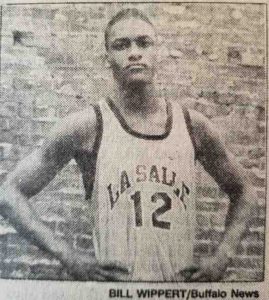 TW: No, not at a young age. It sounds crazy, but you looked up to guys in your neighborhood – the guys at LaSalle Senior High School, for example. Basketball was so big in our city that the teams I liked watching the most were the high schools – Niagara Falls and LaSalle.
TW: No, not at a young age. It sounds crazy, but you looked up to guys in your neighborhood – the guys at LaSalle Senior High School, for example. Basketball was so big in our city that the teams I liked watching the most were the high schools – Niagara Falls and LaSalle.
Modie Cox (pictured) lived right in my neighborhood, just two houses down. He was a hero in my neighborhood. At five and six years old he was the guy that I watched. In terms of the colleges, I didn’t have a favorite team until I got older and then it was Syracuse.
AD: Now were you familiar with any of the other big-time Section VI players like Ritchie Campbell or Marcus Whitfield? Or was Buffalo just that far away a place to the point where your neighborhood was it?
TW: You heard about it, but it was never up close and personal. I remember Ritchie Campbell coming to Niagara Falls to play against Modie in an All-Star game. That was the first time ever seeing him play. I was in awe because he was one of those rare talents that you never see come through your area. From that point it made me pay attention. I wondered, what else was happening in Buffalo? It made you start paying attention to things outside of your neighborhood.
AD: How was Ritchie’s game different than Modie’s?
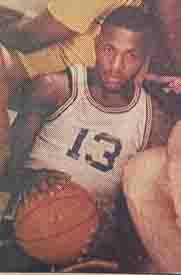 TW: Modie was a pure point guard – a pure leader, and I thought Ritchie was the kind of player who could just do anything. I don’t think there wasn’t anything Ritchie (pictured) couldn’t do as a basketball player. He could shoot and make it from half court, and his ability to get assists was just as effective. If you needed someone to start your engine and get your car going, Modie was that motor.
TW: Modie was a pure point guard – a pure leader, and I thought Ritchie was the kind of player who could just do anything. I don’t think there wasn’t anything Ritchie (pictured) couldn’t do as a basketball player. He could shoot and make it from half court, and his ability to get assists was just as effective. If you needed someone to start your engine and get your car going, Modie was that motor.
AD: I never got to see either of them play, but you always heard of their legends.
TW: They were definitely both legends.
AD: How did you get over to LaSalle?
TW: Again, it was all neighborhood based and I just happened to be one of the lucky kids who lived in that area that sent you to LaSalle and not Niagara Falls High School.
AD: Did Coach Monti start to know you in the seventh grade?
TW: It wasn’t so much that he got to know me. His program was already there and established. A lot of great talent had already come through it. I was in the seventh grade and wanted to give it a shot and try out for the JV. Once I made that JV team, he became familiar with me. It wasn’t really before that. He may have seen me play in the Biddy leagues, but at that age there are a lot of talented kids in Niagara Falls. I pretty much made JV in the seventh grade and it started from there in terms of our relationship.
AD: Was it a big adjustment for you going from the Biddy league to the JV team?
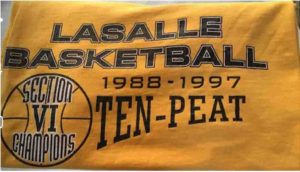 TW: It wasn’t, because I had been playing with older guys all of my life. You grew up getting beat up by Modie Cox, so going to the JV was not that much of a transition. For me it wasn’t a big transition because the JV program was an extension of the Varsity program. It had such a rich tradition that you walked into a ‘well-oiled’ machine.
TW: It wasn’t, because I had been playing with older guys all of my life. You grew up getting beat up by Modie Cox, so going to the JV was not that much of a transition. For me it wasn’t a big transition because the JV program was an extension of the Varsity program. It had such a rich tradition that you walked into a ‘well-oiled’ machine.
AD: Now you guys were probably playing Niagara Falls High School’s JV team, but were you also playing against Grand Island, Kenmore East, Kenmore West, and so on?
TW: Yes, the other teams in the Niagara Frontier League (NFL).
AD: Who was coaching the JV team? Was it Coach Rotundo?
TW: Yes, it was Coach Frank Rotundo.
AD: So, you played JV in the seventh and eighth grades?
TW: Yes, and in the eighth grade I was called up to the Varsity team.
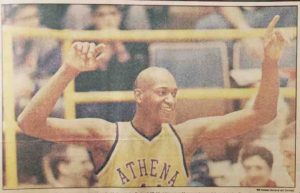 AD: In the eighth grade – how about that. Does that mean you were on the roster when the Carlos Bradberry-led LaSalle team played the John Wallace-led Greece-Athena team in March of 1992 in the Class A Far West Regional?
AD: In the eighth grade – how about that. Does that mean you were on the roster when the Carlos Bradberry-led LaSalle team played the John Wallace-led Greece-Athena team in March of 1992 in the Class A Far West Regional?
TW: Yes.
AD: Sweet.
TW: Yes – John Wallace – ‘DA MAN’.
AD: Yes, he had that cut on the back of his head in fat letters. That 1991-92 season was my first year on our Varsity team at Hutch-Tech and you all beat us decisively in the Festival of Lights Tournament. From that point on I kept my eyes on what LaSalle was doing. I taped that Far West Regional game, and I watched it most of the summertime.
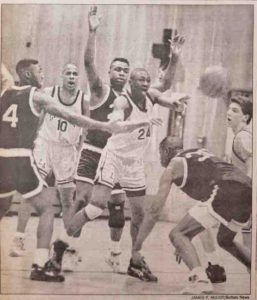 I was thinking that the next year I would get to play against Carlos Bradberry, Curtis Ralands, Todd Guetta, Chris Frank, and the rest of the guys on that team. I was sidelined by an injury the next season. We opened up the Festival of Lights Tournament the next season against the Niagara Falls Power Cats and lost to them. We didn’t advance to play you guys anyway, but you always wonder what if.
I was thinking that the next year I would get to play against Carlos Bradberry, Curtis Ralands, Todd Guetta, Chris Frank, and the rest of the guys on that team. I was sidelined by an injury the next season. We opened up the Festival of Lights Tournament the next season against the Niagara Falls Power Cats and lost to them. We didn’t advance to play you guys anyway, but you always wonder what if.
Once Shino Ellis graduated I thought Jody Crymes – also very talented and lightening quick- would be the next guard up to start alongside Carlos in the backcourt, but suddenly I started hearing about a player named Tim Winn. I was wondering, ‘Who is Tim Winn?’ Describe your freshman season.
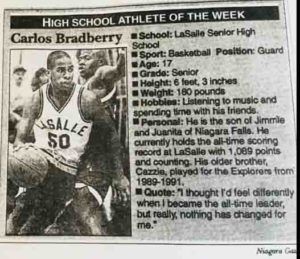 TW: It was a rollercoaster ride for me. As you said, Jody was coming into his sophomore year, and with me coming up onto the Varsity team I didn’t know what kind of a role I’d have. I knew that it would be small at first because we had a lot of seniors coming back – Carlos Bradberry was the man. For me, I just wanted to soak it all up, to ‘get in where I fit in,’ as they say.
TW: It was a rollercoaster ride for me. As you said, Jody was coming into his sophomore year, and with me coming up onto the Varsity team I didn’t know what kind of a role I’d have. I knew that it would be small at first because we had a lot of seniors coming back – Carlos Bradberry was the man. For me, I just wanted to soak it all up, to ‘get in where I fit in,’ as they say.
Coach Monti has a way of just throwing you into the fire. If he’s keeping you on the team, he’s keeping you for a reason. We played Olean High School the first game of that season and I scored 14 points off the bench. To be honest it was a shock to me, because I didn’t think that I was ready on that level to come off the bench and contribute. The opportunity was there, and I took advantage of it.
That was Coach Monti’s genius. He throws you in the fire and expects you to be ready. He allowed you to ‘hide’ behind the system.
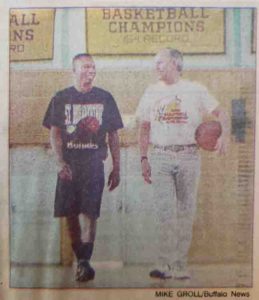 AD: Okay, since we’re on Coach Monti, what was it like inside the LaSalle basketball program? I remember you guys played suffocating defense, created a lot of turnovers – a lot of pressing, some zone, and then boom you guys were immediately down at the other basket, laying it up or dunking it.
AD: Okay, since we’re on Coach Monti, what was it like inside the LaSalle basketball program? I remember you guys played suffocating defense, created a lot of turnovers – a lot of pressing, some zone, and then boom you guys were immediately down at the other basket, laying it up or dunking it.
TW: For me, the blessing was that the program was already established. There was a way of going about your business and there were expectations that the program already had. It also just so happened to meet my skill set somewhere in the middle. It was a ‘no nonsense’ program, and it wasn’t a program where you could just come to practice, roll out the balls and start playing.
Coach Monti is a huge stickler on drills, drills, drills. I learned more at LaSalle than I learned in my whole career when you include college and the pros – just knowing how to play the game. It’s not even close. That experience had me super prepared for anything after that. Coach Monti took the time to teach you how to play, and then he demanded that you play the right way.
AD: What was playing the ‘right’ way for Coach Monti? Was it running his offense? Was it boxing out on defense?
TW: If you didn’t play defense at LaSalle, you didn’t play! His defensive tradition was unreal. It didn’t matter how good you were on offense. It started there. That’s how you win a state championship with four guys my height and a center who was 6’1”. You had to defend – that was the staple of our tradition. We didn’t care who you were playing with or who you had. We were coming in and shutting everything down, and then the offense just fell where it fell.
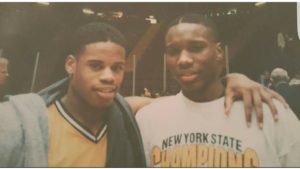 After the defense it was just being unselfish. You’re a team. We didn’t play for stats. The only stats we cared about was the win. That was our bragging point. If there was any arrogance from us, it was based upon getting victories – not me getting 40 points or Jody Crymes (pictured with Tim) getting 20 assists – it was never about that. Those things just came along with it. If we beat you, then we would walk around with our chests poked out a little bit.
After the defense it was just being unselfish. You’re a team. We didn’t play for stats. The only stats we cared about was the win. That was our bragging point. If there was any arrogance from us, it was based upon getting victories – not me getting 40 points or Jody Crymes (pictured with Tim) getting 20 assists – it was never about that. Those things just came along with it. If we beat you, then we would walk around with our chests poked out a little bit.
AD: Does that mean no one was looking to get on ESPN (laughing)?
TW: Not at all and this is the thing – when you have so many great teams who have been there before you, you’re not really competing against Western New York. We never came into a season saying, ‘We’ve got to be as good as Buffalo Traditional.’ We were trying to beat history.
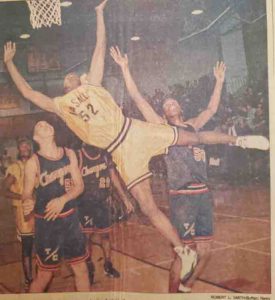 I’ll give you a prime example. After Carlos Bradberry’s senior year, we graduated eight or nine seniors. No one gave us a chance to come back the next year, and to do any work. It was the perfect opportunity for guys like me entering my sophomore year, and Jody entering his junior year to take our claim.
I’ll give you a prime example. After Carlos Bradberry’s senior year, we graduated eight or nine seniors. No one gave us a chance to come back the next year, and to do any work. It was the perfect opportunity for guys like me entering my sophomore year, and Jody entering his junior year to take our claim.
We didn’t care about being better than St. Joe’s or Buffalo Traditional! Could we be better than the team we were on last year? The only way you would get props in our city and our program, was if you were one of the best teams within that program, and that was our motivation. Could we be better than Carlos’s team the year before who had the Player of the Year on it? Could we get back to Glens Falls?
For us, Glens Falls was the standard. It wasn’t winning the NFL. It wasn’t winning Section VI. Could you get to Glens Falls and win a State Championship? So when the standards are that and you have complete buy in from all of the players involved, it at least sets you up for an opportunity to come close every year. You’re not satisfied with beating Lew-Port. You could care less about beating Traditional, which was one of the best teams to ever come out of Western New York. I’m just saying that for us, we’ve got to do what we’ve got to do to get to Stephon Marbury and Glens Falls. We were never satisfied with anything local.
AD: Before we move on, what were those guys like – Carlos Bradberry and his class? Did they welcome you on the team? Did they make you have to prove yourself?
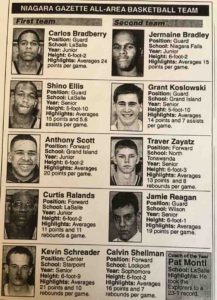 TW: We all grew up playing in the Biddy league, so you were already cool with these guys. So the transition to being their teammate on the Varsity was seamless, because we were already like brothers. I lived two houses down from Carlos when I was in high school. Before I became a Varsity player, I was at his house everyday playing video games.
TW: We all grew up playing in the Biddy league, so you were already cool with these guys. So the transition to being their teammate on the Varsity was seamless, because we were already like brothers. I lived two houses down from Carlos when I was in high school. Before I became a Varsity player, I was at his house everyday playing video games.
That’s the environment we were in – most of the guys who played Varsity hung out together. You grew up playing against the older kids, and a lot of those guys were the older kids. So to become their teammate was almost expected, and that we would all eventually play together.
AD: What did the LaSalle players do in the offseason? Did you guys go to camps? AAU? What were the guys doing?
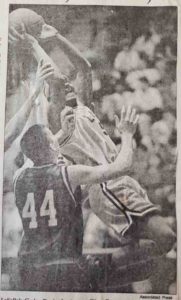 TW: It was different for every player. I went away to the “Five Star Camp”, the “Eastern Invitational”, the “Empire State Games“. For me it was different. Jody did a lot of the same, but there was also a league back home that allowed your team to play in it together. We spent a lot of time together playing in high school basketball leagues, but we also played in “Father Bell” as well in Buffalo. We played together a lot.
TW: It was different for every player. I went away to the “Five Star Camp”, the “Eastern Invitational”, the “Empire State Games“. For me it was different. Jody did a lot of the same, but there was also a league back home that allowed your team to play in it together. We spent a lot of time together playing in high school basketball leagues, but we also played in “Father Bell” as well in Buffalo. We played together a lot.
It’s one thing to stay in your own neighborhood and to compete and succeed, but we also took our show on the road. Once you got to Buffalo in the summertime, and you have guys who may not play together in high school, you might get Jason Rowe and Mark Price on the same team, or Jason and Antoine Sims on the same team. You’re not going to get that staying in Niagara Falls. We felt that if we could find a way to compete against teams that were loaded in the summertime, we knew that we would be better off once the season started.
AD: Coach Monti pointed out that you made the State Tournament all four years which is astounding because, as you remember, many of the Section VI teams were struggling to beat the Section V teams from the Rochester area. When Carlos and his class graduated were you just trying to beat history like you said? What was it like stepping up and doing it yourself 100% of the time?
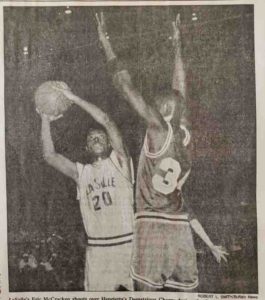 TW: Do you know what it’s like to get a taste of something? I was young at the time. Me and Jody rode Carlos’s coattails to Glens Falls. As much as we may have contributed, it wasn’t our team. His talent was on a different level. No one in Western New York could deal with him and that carried us.
TW: Do you know what it’s like to get a taste of something? I was young at the time. Me and Jody rode Carlos’s coattails to Glens Falls. As much as we may have contributed, it wasn’t our team. His talent was on a different level. No one in Western New York could deal with him and that carried us.
As a young kid, I didn’t know anything else except going to Glens Falls. We got close to winning the year before, but lost to John Wallace’s team. At worst I thought that I was supposed to be in the Far West Regional against a Rochester team. To beat the Rochester team the next year to go to Glens Falls felt like it was where we were supposed to be. It didn’t take much for Coach Monti to sell us at all. He told us, ‘Look. I’m going to watch the games no matter what. You guys can play well enough to join me or you can stay at home.’
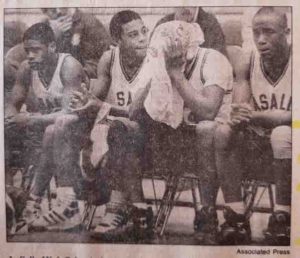 For us it wasn’t a hard sell. Once you get a smell of Glens Falls, there’s nothing else you’d rather have outside of winning it. After riding Carlos’s coattails as a freshman, I wanted my own. The next year I got there as a sophomore and we were immature. No one expected us to be there and the games really took us by storm. We were young kids jumping in the pool at night; just super happy to be in Glens Falls.
For us it wasn’t a hard sell. Once you get a smell of Glens Falls, there’s nothing else you’d rather have outside of winning it. After riding Carlos’s coattails as a freshman, I wanted my own. The next year I got there as a sophomore and we were immature. No one expected us to be there and the games really took us by storm. We were young kids jumping in the pool at night; just super happy to be in Glens Falls.
The maturity showed up in the offseason because we said, ‘Just going to Glens Falls is kind of whack now.’ Afterwards we were coming to win it and that’s what happened my junior year – to me. If my teammate Terry Rich didn’t get hurt, we would’ve beaten Stephon Marbury’s Lincoln team in the Federation Championship. We didn’t have a full team, but we won the State Championship that year.
AD: So your sophomore year, you guys lost in the state semifinal?
TW: Yes, we lost to a well-coached team with lots of shooters. We were just immature. We finished 22-4.
AD: Talk about matching up with Stephon Marbury in your junior year. He was the No. 1 high school player in the nation that year, right?
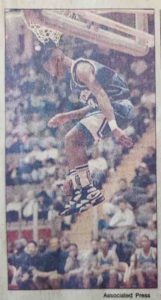 TW: You come into it and you know his reputation. You see all of the highlights. He was a McDonald’s All-American, the top point guard in the country. For me there was going to be no better test to let me know what level I was on than to go up against this guy. I was going to try it all. Whoever I thought I was, I was going to try it in that game, and playing against the best, would expose what I needed to work on.
TW: You come into it and you know his reputation. You see all of the highlights. He was a McDonald’s All-American, the top point guard in the country. For me there was going to be no better test to let me know what level I was on than to go up against this guy. I was going to try it all. Whoever I thought I was, I was going to try it in that game, and playing against the best, would expose what I needed to work on.
We locked him down. He was averaging 30 points a game, and I think we held him to 12 points. That was a springboard for me in my high school career. I felt like if Stephon Marbury couldn’t score on me, nobody was scoring. I didn’t care who you were. I carried that with me for that entire summer – ABCD Basketball Camp – everywhere I went. It carried into my senior year when we lost two of my favorite players of all time that I played with, Jody Crymes and Terry Rich. Nobody was expecting me to go back to Glens Falls my senior year.
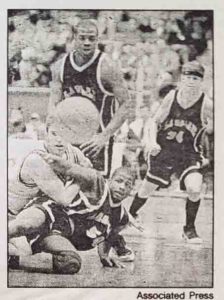 AD: After losing Jody and Terry, how did you reload? Who filled in for them? Or did you just go up another level?
AD: After losing Jody and Terry, how did you reload? Who filled in for them? Or did you just go up another level?
TW: It was a combination of things. For me individually, my game went ten notches up from going to ABCD Camp and playing against the best point guards. I put a lot of work into my game, so I was a lot better than in my junior year.
We also had guys like Roddy Gayle and Carlos Davis who had small roles with us the year before (both pictured to the left). They stepped up big time. For the first time in a long time, it wasn’t just a guard-led team. These guys were my center and my forward even though they were both just 6’. So they really stepped up!
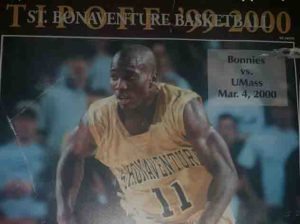 Thank you for taking the time to read this interview. In part two, Tim talks more about playing in the LaSalle basketball program, where he played college basketball, the closing of LaSalle Senior High School, and finally how basketball has changed. If you enjoyed this, you might also enjoy:
Thank you for taking the time to read this interview. In part two, Tim talks more about playing in the LaSalle basketball program, where he played college basketball, the closing of LaSalle Senior High School, and finally how basketball has changed. If you enjoyed this, you might also enjoy:
• Niagara Falls coaching legend Pat Monti discusses building, and leading the LaSalle basketball dynasty part one
• Jason Rowe discusses Buffalo Traditional Basketball, the Yale Cup, and State Tournaments
• Buffalo Traditional’s Jason Rowe discusses his college and professional basketball careers and coaching
• Lasting lessons basketball taught me: Reflections on three years of basketball camp
• Chris Herren discusses his journey, drug addiction, substance abuse and wellness
Video Interviews With Tim Winn, Modie Cox and other members of the LaSalle Basketball Dynasty
Niagara Falls Basketball Legend Tim Winn Discusses LaSalle Basketball And Training To Win
Maurice “Modie” Cox Discusses Playing In Niagara Falls LaSalle Basketball Dynasty
The December 2020 Niagara Falls LaSalle Senior High School Basketball Dynasty Live Stream

The video link is here: https://www.youtube.com/watch?v=5O7_ddrCwX0
Closing Thoughts
I intend to create more promotional/teaser pieces for The Engineers: A Western New York Basketball Story, both via print and video as I journey through the final steps of completing the book. I created a page on Big Words Authors for the purpose of giving a background of the book and grouping all the promotional pieces, such as this in one, for interested readers.
The Big Words LLC Newsletter
For the next phase of my writing journey, I’m starting a monthly newsletter for my writing and video content creation company, the Big Words LLC. In it, I plan to share inspirational words, pieces from this blog and my first blog, and select videos from my four YouTube channels. Finally, I will share updates for my book project The Engineers: A Western New York Basketball Story. Your personal information and privacy will be protected. Click this link and register using the sign-up button at the bottom of the announcement. If there is some issue signing up using the link provided, you can also email me at bwllcnl@gmail.com . Yours in good sports. Best Regards.

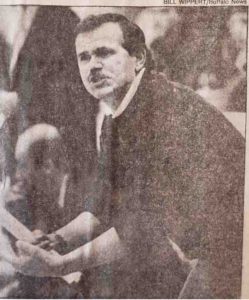
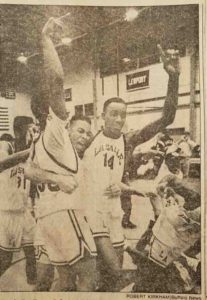
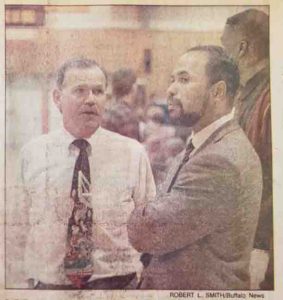
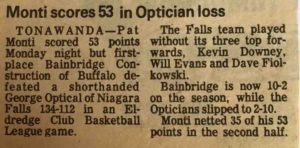
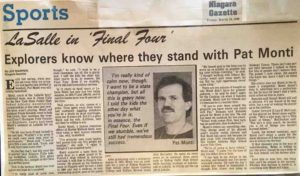
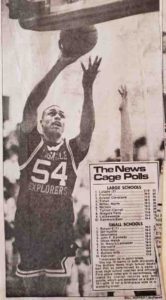
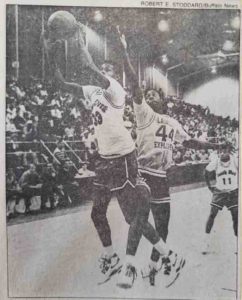
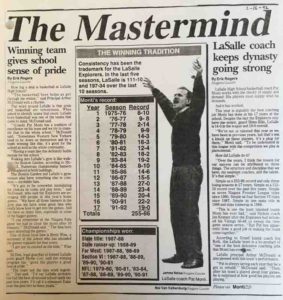
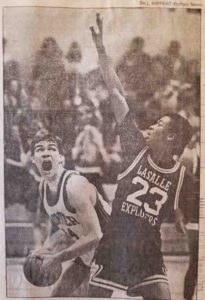
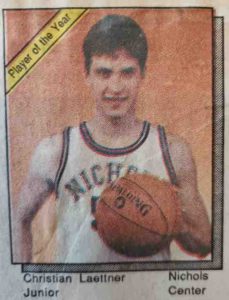
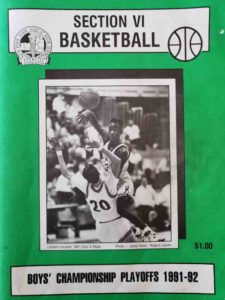
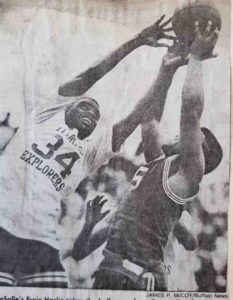
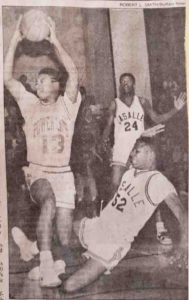
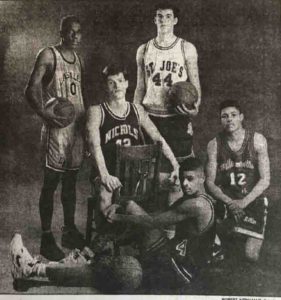
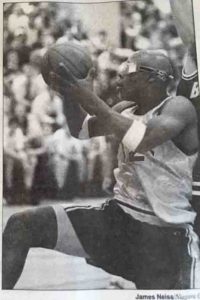
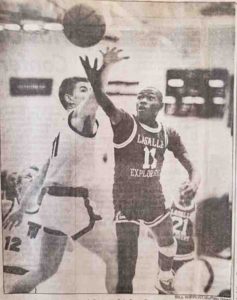
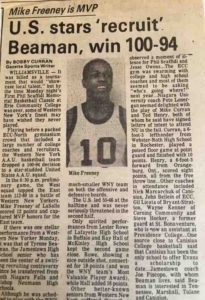
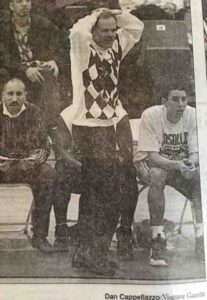

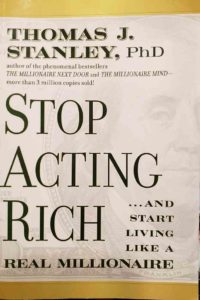

 The first
The first 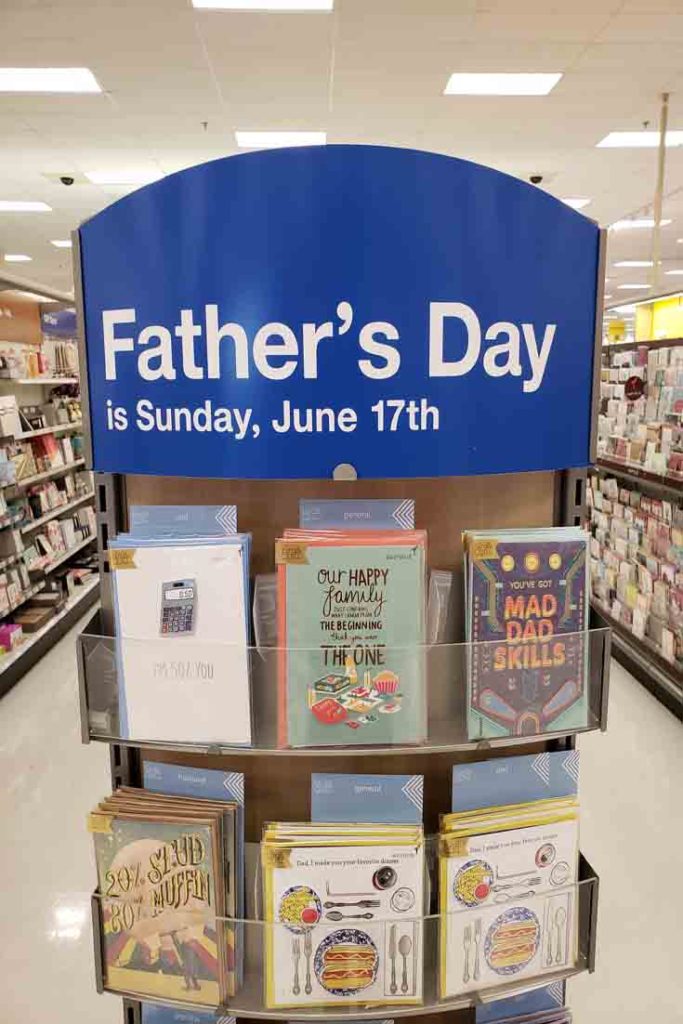



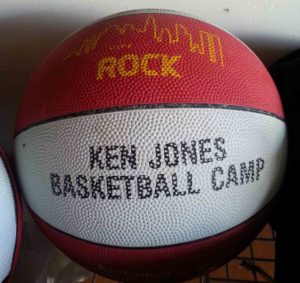 The first
The first 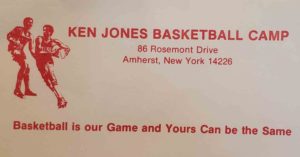 “Basketball is our game and yours can be the same,” was the signature quote of the Ken Jones Basketball Camp – the camp run by Dr. Kenneth Leon Jones, my first high school basketball coach. He told us students more times than I can remember, “I’m a student of the game!” He ate, slept and breathed the great game of basketball. Our basketball program at
“Basketball is our game and yours can be the same,” was the signature quote of the Ken Jones Basketball Camp – the camp run by Dr. Kenneth Leon Jones, my first high school basketball coach. He told us students more times than I can remember, “I’m a student of the game!” He ate, slept and breathed the great game of basketball. Our basketball program at 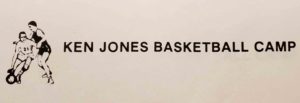 I’ll point out here that my perception of attending the camp as an ‘in’ to get on the Varsity team was a flawed way of thinking. There were several peers who attended the camp and didn’t make the team during those years. For any prospective players or parents reading this, it’s very important for kids with aspirations of playing sports to understand that spots on their school’s roster should be, and must be, earned. Spots on the roster should be awarded based on skills and preparation – not some form of favoritism or partiality – both of which do happen in the real world at workplaces later in life.
I’ll point out here that my perception of attending the camp as an ‘in’ to get on the Varsity team was a flawed way of thinking. There were several peers who attended the camp and didn’t make the team during those years. For any prospective players or parents reading this, it’s very important for kids with aspirations of playing sports to understand that spots on their school’s roster should be, and must be, earned. Spots on the roster should be awarded based on skills and preparation – not some form of favoritism or partiality – both of which do happen in the real world at workplaces later in life.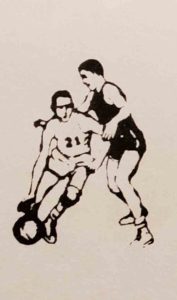 The Ken Jones Basketball Camp was a ‘teaching’ camp. In the early 1990s it was held at
The Ken Jones Basketball Camp was a ‘teaching’ camp. In the early 1990s it was held at 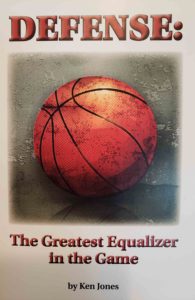 It was a very ‘organized’ style of basketball they taught us there – very different than the ‘street-style’ we played in Buffalo which involved mostly, “going up strong to the ‘hole’,” and usually watching your teammates dominate the ball on offense while everyone else stood around watching – ‘isolation’ basketball. As I was going into the camp looking to become a much better offensive player, I was very much surprised by the amount of time we spent on defensive principles and fundamentals.
It was a very ‘organized’ style of basketball they taught us there – very different than the ‘street-style’ we played in Buffalo which involved mostly, “going up strong to the ‘hole’,” and usually watching your teammates dominate the ball on offense while everyone else stood around watching – ‘isolation’ basketball. As I was going into the camp looking to become a much better offensive player, I was very much surprised by the amount of time we spent on defensive principles and fundamentals.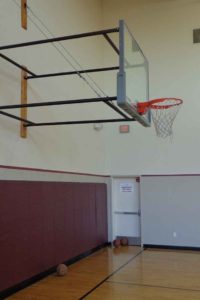 Afterwards, it would take hours and hours perfecting those fundamentals, and then learning how to use them in actual competition. This is the actual “development” – something that takes time, focus and commitment. When I look back on those years, I also realize that I was also developing on my own. In a game like basketball, if you want to play at the highest levels, you have to not only develop yourself personally, but you also have to figure out how to coalesce and build chemistry with the group of players you’re going to be playing with in competition.
Afterwards, it would take hours and hours perfecting those fundamentals, and then learning how to use them in actual competition. This is the actual “development” – something that takes time, focus and commitment. When I look back on those years, I also realize that I was also developing on my own. In a game like basketball, if you want to play at the highest levels, you have to not only develop yourself personally, but you also have to figure out how to coalesce and build chemistry with the group of players you’re going to be playing with in competition.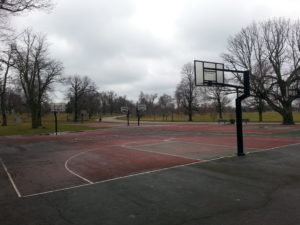 And again, not every family had the money to send their kids to camp which probably created some envy. Some kids wanted to play on the basketball team and didn’t for whatever reason. When you’re a player on a team, you don’t know how your classmates and peers are viewing you and your opportunities until you yourself are going through a hardship of some sort. This also underscores the importance of having the mental strength I discussed in part three of this series.
And again, not every family had the money to send their kids to camp which probably created some envy. Some kids wanted to play on the basketball team and didn’t for whatever reason. When you’re a player on a team, you don’t know how your classmates and peers are viewing you and your opportunities until you yourself are going through a hardship of some sort. This also underscores the importance of having the mental strength I discussed in part three of this series.
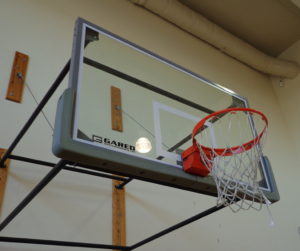 This article was originally the conclusion of the series titled the
This article was originally the conclusion of the series titled the 